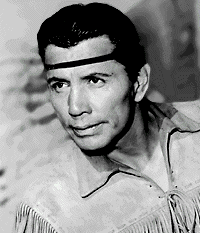
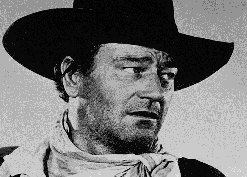 Some quotes from Native and Euro-Americans suggest the differences in their worldviews or philosophical beliefs:
Some quotes from Native and Euro-Americans suggest the differences in their worldviews or philosophical beliefs:

 Some quotes from Native and Euro-Americans suggest the differences in their worldviews or philosophical beliefs:
Some quotes from Native and Euro-Americans suggest the differences in their worldviews or philosophical beliefs:
Before Columbus—the indigenous perspective
The world appears to primitive man neither inanimate nor empty but redundant with life; and life has individuality, in man and beast and plant, and in every phenomenon which confronts man-the thunderclap, the sudden shadow, the eerie and unknown clearing in the wood, the stone which suddenly hurts him when he stumbles while on a hunting trip. Any phenomenon may at any time face him, not as "It," but as "Thou." In this confrontation, "Thou" reveals its individuality, its qualities, its will. "Thou" is not contemplated with intellectual detachment; it is experienced as life confronting life, involving every faculty of man in a reciprocal relationship.
Henri Frankfort et al., Before Philosophy
In contrast to the biblical book of Genesis, in which God creates man in his own image and gives him dominion over all other creatures, the Native American legends reflect the view that human beings are no more important than any other thing, whether alive or inanimate. In the eye of the Creator, they believe, man and woman, plant and animal, water and stone, are all equal, and they share the earth as partners—even as family.
Recurring themes include the idea of Mother Earth as life host, the relationship of reciprocity that exists between human beings and animals, and the Indians' dependence on animals as teachers. The plots are often complex, take numerous twists and turns, and commonly include humor. But any comic elements never detract from the story's sacred purpose.
The Spirit World (American Indians), Time-Life Books, p. 19
They choose their kings by birth, their generals for merit. These kings have not unlimited or arbitrary power, and the generals do more by example than by authority. If they are energetic, if they are conspicuous, if they fight in the front, they lead because they are admired. But to reprimand, to imprison, even to flog, is permitted to the priests alone, and that not as a punishment, or at the general's bidding, but, as it were, by the mandate of the god whom they believe to inspire the warrior. They also carry with them into battle certain figures and images taken from their sacred groves. And what most stimulates their courage is, that their squadrons or battalions, instead of being formed by chance or by a fortuitous gathering, are composed of families and clans. Close by them, too, are those dearest to them, so that they hear the shrieks of women, the cries of infants. They are to every man the most sacred witnesses of his bravery—they are his most generous applauders. The soldier brings his wounds to mother and wife, who shrink not from counting or even demanding them and who administer food and encouragement to the combatants.
Tacitus, Germania, describing the "primitive" Germans, c. AD 100
Before Columbus—the Western perspective
But among barbarians no distinction is made between women and slaves, because there is no natural ruler among them: they are a community of slaves, male and female. Wherefore the poets say,
It is meet that Hellenes should rule over barbarians;
as if they thought that the barbarian and the slave were by nature one.
Aristotle, Politics, II, 350 BC
For that some should rule and others be ruled is a thing not only necessary, but expedient; from the hour of their birth, some are marked out for subjection, others for rule.
Again, the male is by nature superior, and the female inferior; and the one rules, and the other is ruled; this principle, of necessity, extends to all mankind.
It is clear, then, that some men are by nature free, and others slaves, and that for these latter slavery is both expedient and right.
Aristotle, Politics, III, 350 BC
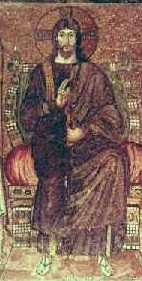
Stark points out that the easygoing attitude of the ancient polytheists toward religious diversity was replaced in ancient Rome by what he bluntly calls "Christian terrorism" and, later, the "official religious coercion" of the Roman state authorities. Significantly, the punishment of "heretics" included not only pagans but fellow Christians who strayed from the articles of faith as they were defined by the dominant religious leadership, including "anyone who celebrated Easter on the wrong day of the year."
Jonathan Kirsch, review of One True God: Historical Consequences of Monotheism by Rodney Stark, LA Times, 11/3/01
The city of this world, to begin with, has had certain "wise men" of its own mold, whom true religion must reject, because either out of their own daydreaming or out of demonic deception these wise men came to believe that a multiplicity of divinities was allied with human life, with different duties, in some strange arrangement, and different assignments: this one over the body, that one over the mind; in the body itself, one over the head, another over the neck, still others, one for each bodily part; in the mind, one over the intelligence, another over learning, another over temper, another over desire; in the realities, related to life, that lie about us, one over flocks and one over wheat, one over wine, one over oil, and another over forests, one over currency, another over navigation, and still another over warfare and victory, one over marriage, a different one over fecundity and childbirth, so on and so on.
The heavenly City, on the contrary, knows and, by religious faith, believes that it must adore one God alone and serve Him with that complete dedication which the Greeks call latreía and which belongs to Him alone.
St. Augustine, The City of God, Book XIX, Chapter 17, demonizing non-Christians, c. AD 420
The shift [in early Christians' view of Christ] occurred around the turn of the first millennium. Before that time, pious Christians prayed to Christ as the all-powerful King of Heaven rather than as the man who had died a humiliating death. According to many early church authorities, the crucified Christ was an image not of reassurance but of judgment. In their view, when Christ came to judge the living and the dead at the end of time, only the damned would see him emblazoned with his wounds.
University of Chicago Magazine, December 1999, paraphrasing Rachel Fulton, assistant professor of history
In a very dirty and vile work room
You were made out of slime,
So foul and so wretched
That my lips cannot bring themselves to tell you about it.
But if you have a bit of sense, you will know
That the fragile body in which you lived,
Where you were tormented eight months and more,
Was made of rotting and corrupt excrement...
You came out through a foul passage
And you fell into the world, poor and naked...
...Other creatures have some use:
Meat and bone, wool and leather;
But you, stinking man, you are worse than dung:
For you, man, comes only pus...
From you comes no virtue,
You are sly and evil traitor;
Look in front of you and look behind,
For your life is like your shadow
Which quickly comes and quickly goes...
Giamcomino di Verona, 13th-century Franciscan monk—from H.Spitzmuller, Italian Poetry of the Middle Ages (12th through 15th centuries), Vol. 1, pgs. 723-725
Tom: ...the Greatest Warrior of Them All, Jesus Christ.
Rob: Thanks for summing up what's wrong with 2,000 years of Euro-American history in one phrase. "The Greatest Warrior of Them All, Jesus Christ"...wow.
E-mail exchange, 3/26/01

In 2000 Pope John Paul II reiterated that Christianity is the only path to salvation. Now we have Tom's description of Jesus. That suggests how the judgmental Christian beliefs of the first millennium flourished in the second millennium and remain alive and well in the third.
And what a charming poem from the monk on the evils of human flesh, the basis for original sin. Such a Christian view, and so antithetical to Native views. The idea that humans are above and beyond nature, rather than a part of it, is so typically Western.
Related links
What Jesus said
"Dominate" goes way back
Those evil European invaders
After Columbus—the indigenous perspective
As Western civilization grew and took dominance over the world, it failed to resolve some basic issues. A view of the natural world as primarily physical matter with little spiritual content took hold and became the practical metaphysics for human affairs.
Vine Deloria Jr. (Sioux), Red Earth, White Lies
We understand that your religion is written in a book. If it was intended for us as well, why has not the Great Spirit given it to us? Why did He not give to our forefathers the knowledge of that book, with the means of understanding it rightly?
Brother, you say there is but one way to worship and serve the Great Spirit. If there is but one religion, why do you white people differ so much about it? Why not all agree, as you can all read the book?
Brother, the Great Spirit has made us all. But He has made a great difference between His white and red children. He has given us a different complexion and different customs. Since He has made so great a difference between us in other things, why may we not conclude that He has given us a different religion, according to our understanding?
Brother, we do not wish to destroy your religion or take it from you. We only want to enjoy our own.
Chief Red Jacket (Seneca), 1805
How can we have confidence in the white people? When Jesus Christ came upon the earth, you killed him, the son of your own God, you nailed him up! You thought he was dead, but you were mistaken. And only after you thought you killed him did you worship him, and start killing those who would not worship him. What kind of a people is this for us to trust?
Tecumseh (Shawnee), speech to William Harrison, Governor of the Indiana Territory, August 11, 1810
Your religion was written on tables of stone by the iron finger of an angry God, lest you might forget it. The red-man could never remember nor comprehend it.
Our religion is the traditions of our ancestors, the dreams of our old men, given them by the great Spirit, and the visions of our sachems, and is written in the hearts of our people.
Your dead cease to love you and the homes of their nativity as soon as they pass the portals of the tomb. They wander far off beyond the stars, are soon forgotten, and never return. Our dead never forget the beautiful world that gave them being. They still love its winding rivers, its great mountains and its sequestered vales, and they ever yearn in tenderest affection over the lonely hearted living and often return to visit and comfort them.
Chief Seattle (Suquamish), from a speech, 1855?
The Indian loved to worship. From birth to death, he revered his surroundings. He considered himself born in the luxurious lap of Mother Earth, and no place was to him humble. There was nothing between him and the Big Holy (Wakan Tanka). The contact was immediate and personal, and the blessings of Wakan Tanka flowed over the Indian like rain showered from the sky. Wakan Tanka was not aloof, apart, and ever seeking to quell evil forces. He did not punish the animals and the birds, and likewise, he did not punish man. He was not a punishing god. For there was never a question as to the supremacy of an evil power over and above the power of Good. There was but one ruling power, and that was Good.
Luther Standing Bear (Oglala Sioux), 1868-1937
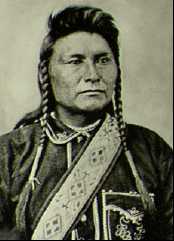
[Churches] will teach us to quarrel about God, as the Catholics and Protestants do on the Nez Perce reservation and other places. We do not want to learn that. We may quarrel with men sometimes, but we never quarrel about God. We do not want to learn that.
Chief Joseph (Nez Perce), "A Meeting of Former Foes," 1904
The culture and civilization of the Whiteman are essentially material; his measure of success is "How much property have I acquired for myself?" The culture of the Redman is fundamentally spiritual; his measure of success is, "How much service have I rendered to my people?" His mode of life, his thought, his every act are given spiritual significance, approached and coloured with complete realization of the spirit world.
Ernest Thompson Seton and Julia Seton, "The Soul of the Red Man: His Spirituality," The Gospel of the Redman, 1936
After Columbus—the Western perspective
What good man would prefer a country covered with forests and ranged by a few thousand savages to our extensive Republic, studded with cities, towns, and prosperous farms, embellished with all the improvements which art can devise or industry execute, occupied by more than 12,000,000 happy people, and filled with all the blessings of liberty, civilization, and religion?
Andrew Jackson, First Annual Message to Congress, December 8, 1830
The establishment of Christian missions should be encouraged, and their schools fostered....The religion of our blessed Savior is believed to be the most effective agent for the civilization of any people.
1869 Board of Indian Commissioners Annual Report 10
With justice, personal rights, and the protection of law, the Gospel will do for our Red brothers what it has done for other races—give to them homes, manhood and freedom.
H.B. Whipple, 1881, quoted in Helen Hunt Jackson's A Century of Dishonor: A Sketch of the United States Dealings with Some of the Indian Tribes, 1995
[Allotment of land] will inspire the Indian with new faith in our government; it will encourage him to greater effort toward a nobler and better life; it will secure to him the integrity of the family and the home—the unit of Christian civilization.
1881 Board of Indian Commissioners Annual Report
[N]o people will reach a high state of civilization under the communistic system, and without the incentive to labor and enterprise that the right to individual ownership of property inspires.
1881 Board of Indian Commissioners Annual Report
As they gradually get accustomed to work and become more interested in accumulating property, the cruder sports [dancing] will die out and give place to more enlightened amusements.
W.W. Anderson, Crow Creek and Lower Brule Consolidated Agency, Aug. 28, 1886, quoted in the 1886 Commission on Indian Affairs Annual Report
Farming, a home, the accumulation of property, a higher social and political status, a feeling of manhood...will wean them from those old customs [dancing].
J.F. Kinney, Yankton Agency, Aug. 20, 1888, quoted in the 1888 Commission on Indian Affairs Annual Report
The Oriental doesn't put the same high price on life as does the Westerner.
General William Westmoreland, c. 1968
Modern views
[Native author Thomas] King comments in All My Relations on the inherent difference between white man's religion and the spirituality of Native Indians: "Native writers [are concerned with creating] a particular kind of world in which the Judeo-Christian concern with good and evil and order and disorder is replaced with the more Native concern for balance and harmony" (xiii). King would include within this difference, the Native concern for community and equality over white man's concern for autonomy and superiority.
Ann Barrow, Hawkeye: The Ambivalent Hero
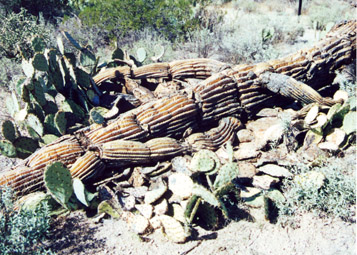
We seem to want a world where there is a master plan and this plan states that our behavior will not be punished, our appetites will not be curbed, our present will not determine the future. We will be exempt from death, from hunger, from pain, from everything but love. And love will not be earned but freely given like that of a parent to a child. We say that such a world is our due, is our right, is part of the master plan. We say this to our politicians, to our friends, to our gods, to our dreams.
Charles Bowden, The Sonoran Desert
I mentioned that there is a fundamental difference between the way Indians and non-Indians experience the world. This difference goes all the way back to the bible, and Genesis. In Genesis, the first book of the Old Testament, God creates man in his own image. Then God says, "be fruitful, multiply, fill the earth and conquer it. Be masters of the fish of the sea, the birds of the heaven, and all living animals on the earth."
Masters. Conquer. Nothing, nothing could be further from the way Indian people view the world and our place in it. Here are the words of the great nineteenth century Chief Seattle: "You are a part of the earth, and the earth is a part of you. You did not weave the web of life, you are merely a strand in it. Whatever you do to the web, you do to yourself."
In our tradition, there is no mastery. There is no conquering. Instead, there is kinship among all creation-humans, animals, birds, plants, even rocks. We are all part of the sacred hoop of the world, and we must all live in harmony with each other if that hoop is to remain unbroken.
When you begin to see the world this way — through Indian eyes — you will begin to understand our view of land, and treaties, very differently. You will begin to understand that when we speak of Father Sun and Mother Earth, these are not new-age catchwords — they are very real terms of respect for very real beings.
And when you understand this, then you will understand that our fight for treaty rights is not just about hunting deer or catching fish. It is about teaching our children to honor Mother Earth and Father Sun. It is about teaching them to respectfully receive the gifts these loving parents offer us in return for the care we give them. And it is about teaching this generation and the generations yet to come about their place in the web of life.
Marge Anderson, Chief Executive, Mille Lacs Band of Ojibwe, The Value of Indian Culture (speech delivered to the First Friday Club of the Twin Cities, St. Paul, Minnesota), 3/5/99
Perhaps the most painful realization for Americans is that in many of these foreign locales — particularly South America, the Pacific islands, Indonesia, and the Philippines — the natives' struggles to maintain their lands and sovereignty is often directed against United States corporations, or technology, or military. More to the point, it is directed against a mentality, and an approach to the planet and to the human place on Earth, that native people find fatally flawed. For all the centuries they've been in contact with us, they've been saying that our outlook is missing something. But we have ignored what they say. To have heeded them would have meant stopping what we were doing and seeking another path. It is this very difference in world views that has made the assault on Indian people inevitable.
Jerry Mander, In the Absence of the Sacred, 1991
Part of the puzzle of the human condition is coming to terms with order and chaos. It seems that humans occupy the boundary between these two states. And a lot of human thought is devoted to understanding these. The "big three" of organised religion, Judaism, Christianity, and Islam, assign the god of order to the heavens, and align him with good. They look with jaundiced eye toward death, suffering, passion, the chaotic elements of life, and dream of a paradise lost in the distant past and renewable thru obedience to sacred creed, in which chaos do not exist. They sing of a city of God and prophesy a time when the god of chaos, thought of as evil, will be bound and cast into the underworld. When I hear talk of the City of God, I cringe. God doesn't build cities, cities are the work of humans.
Other ways of thought, indigenous to the peoples of the lands, take a different view. They accept chaos as part of the conditions of life. They assign a trickster god a place in the scheme of creation and a home on this earth. Some even speculate that the god of order is the one who occupies the underworld, while the trickster is the supreme god or force in this world of dust and meat.
E-mail from a Native woman, 1/10/00
Specifically, I will tell you that it is my experience and all of our collective experience that the things which I have outlined as basic tenets of indigenous ecological thinking and of natural law, the idea of natural law being preeminent, the idea of balance, of reciprocity, taking only what you need, leaving the rest, cyclical thinking and all things being alive and the requirement and responsibility of humans to respect those things, those are in sharp contrast to the thinking of this society. That is my experience. In this society I believe that instead of the perception that all things are animate, that natural law is preeminent, the society holds instead man's dominion over nature, the perception that somehow man has a god-given right to all things in nature and that man has the right to make the rules and all else should live in accordance with man's rules. In this society we do not believe that natural law is preeminent. In America we believe that man is preeminent. It is, of course, usually man.
I believe that this society also forwards a perception of linear thinking, in stark contrast to cyclical thinking. I believe that this has to do first of all with how you're taught time in this country on a time line. The time line usually begins around 1492 and continues from there on out, with a number of dates that are of importance to someone. I was never sure who, but they are of importance to someone. That's how we're taught time. The consequence of linear thinking, permeating our consciousness in America, is that for instance there are values which go along with linear thinking, like the idea of progress, defined by indicators like "economic growth" and "technological advancement." You want to have progress. Where you want to be. So we have an underlying perception in the society that we need to have progress when we move along the time line.

There are also other perceptions associated with this kind of thinking. A perception of the "wild" and the "tame." The land is wild. The untamed wilderness of America, and the attendant policy of manifest destiny which was a consequence of that. Also, the perception of peoples as primitive and other peoples as civilized. That is associated with linear thinking. It is my experience, and other people of color's experience, that people who are viewed as civilized are usually people of European descent, and people who are viewed as primitive are usually people of color. I believe that those perceptions permeate thinking in this society and that they have been taken well into the environmental movement. That is the problem that we face today.
Winona LaDuke (Anishinaabe), Social Justice, Racism and the Environmental Movement, 9/28/93
The West didn't get wild until the white people got there. There's no such word as wild in the Indian languages. The closest we can get to it is the word free. We were free people.
Oren R. Lyons (Onandaga), quoted in "R.I.P. Tonto," Esquire, February 1994
The process [of writing] itself epitomizes the European concept of "legitimate" thinking: what is written has importance that is denied the spoken. My culture, the Lakota culture, has an oral tradition, so I ordinarily reject writing. It is one of the white world's ways of destroying the cultures of non-European peoples, the imposing of an abstraction over the spoken relationship of a people.
Russell Means, Mother Jones, Dec. 1980
For far too long we have seen the inequity and downright failure of the Western model vis-à-vis American Indian peoples. The same pattern has replicated itself throughout the world and continues today with mainstream economic development still exploiting Indigenous peoples throughout the globe.
So, we are seeing happening to mainstream society what tribes have long experienced at the hands of the Western economic model and its so-called economic development. The general society is just waking up to the logical results of a model that glorifies creating a few very rich at the expense of many very poor.
In contrast, American Indian ways mean economic development activities which are driven by a community's cultural values, based on kinship, shared responsibilities and benefits and respect for the environment.
Rebecca Adamson, Cultural Values Should Take Leading Role in Economic Decision-Making, Indian Country Today, 7/4/01
Growing up on an Osage reservation in Pawhuska, Kansas, [Marcelyn M Kropp] immersed herself in native culture. The OU doctoral student, who moved to Athens three years ago, said she is still getting used to the way other Americans value self-promotion over collective identity.
"There's a sense of sharing I don't see everywhere else," Kropp said. "It's not about material gain. It's not about who has the most toys. (In Kaw and Osage culture) it's about sharing and making sure everybody has what they need."
"Native Americans Face Stereotypes," The Post (Ohio University), 11/1/01
Specific cultural differences
Ecological Indian talk (respect for nature)
Uncivilized Indians (reverence, honesty, generosity)
Savage Indians (cruelty and warfare)
Contrasting views of time and place
From the Carroll County Times:
What American Indians can teach Christians about time and place
By Diane Reynolds, Times Staff Writer
Sunday, September 24, 2006
When the white buffalo was transformed into a woman and brought the sacred pipe to the Lakota, it ushered in a beginning of their history, according to traditional Lakota thought.
With the gift of the sacred pipe, the Lakota achieved a spiritual bond with the buffalo and other animals so that they could hunt them and live on them, said Ray DeMallie, a Phi Beta Kappa visiting scholar at McDaniel College in Westminster, during a talk Monday at the school.
Life improved for the Lakota at the start of this new cycle, then settled into equilibrium or stasis.
Except for the seasons, there were no major changes, DeMallie said.
"People were living in the here and now," he said. "This was the best it would get. Time wasn't going anywhere."
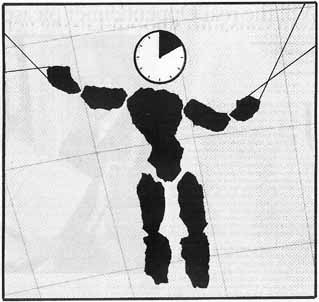
In contrast, Western culture perceives time as linear, progressing in fixed, measurable units toward an end.
"We speak of time as progression," he said.
Christian thought, with its theology of an end of time in which God will establish a kingdom of heaven on earth, drives the Western concept of time, said Lee Irwin, chairman of the religious studies department at the College of Charleston in South Carolina.
*
Jewish thought points to a human Messiah to come, who will bring peace on earth, said Barry Feinstein, leader of the Westminster Jewish Congregation.
And many Westerners believe humankind can achieve world peace on its own because the world is progressing — or getting better — over time.
But can we make that assumption of progress? DeMallie asked.
For traditional Lakota Indians, he said, such a concept of achieving such a Utopian goal would be alien in a world that moves in unchanging natural cycles.
Indian views of time
While the Lakota considered time as cyclical, they still measured linear time.
They created winter counts, pictorial representations that marked time by recording a major event for each year.
In one Lakota year, they killed 30 Crow Indians; in another year, they signed a treaty with the whites.
They measured a year from the first snowfall in autumn, so year lengths would vary.
In general, Irwin said, Americans Indians stressed living in constant contact with nature, which they believed would keep them rooted in the sacred and in the present moment.
"The cycles just repeat and repeat," he said.
We could learn to live more fully in the present moment from the Indians, he said.
Unlike in Judaism and Christianity, Indian spiritual practice was tied directly to nature by a cycle of sacred events, he said, noting that spiritual practices varied widely from tribe to tribe.
But overall, living in constant contact with nature's time was essential to gain sacred wisdom.
Jews and Christians also have a cycle of sacred events, Irwin said, but it's a ritual cycle, not a directly seasonal one.
For example, he said, Christmas happens to be in winter, but could occur in any season.
This Western divorce from nature, driven by different notions of time, has caused conflict with the Indians.
Christian contact
For example, when whites began to tell the Lakota that they had to become settled farmers because the buffalo were becoming extinct, the Lakota had no concept of time that would allow them to understand the concept of extinction, DeMallie said.
Because of this, Westerners characterized the Lakotas as childlike.
But to the Lakotas, it was the whites who were childlike.
They argued that if the whites would go away and stop disrupting their sacred cycles of nature and time, the buffalo would return.
There was no inevitable "progress" toward extinction.
Since first contacts, Christianity has, however, influenced Indian notions of time, Irwin said.
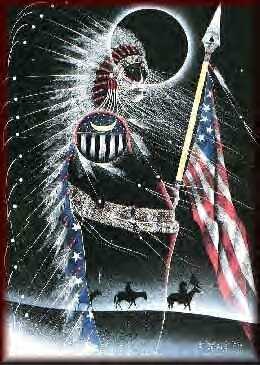
In the nineteenth century, the Indians developed a ghost dance prophecy of an end of time when all the white people would die, DeMallie said.
This kind of apocalyptic vision is directly taken from Christianity, Irwin said, because Indians had no native tradition of an apocalypse.
Christian influences also led the Indians to the white buffalo prophecy.
In this prophecy, the end of the Indian suffering will come when four albino buffalo have been born.
Three have already been born, Irwin said.
But the birth of the final buffalo will not lead to the end of time in the Christian sense but to the beginning of a new cycle of life.
Which civilization is better?
The typical American pundit asserts, usually on Columbus Day, that Western civilization is superior to Native civilization. Here's a response from The Gospel of the Redman by Ernest Thomspon Seton and Julia Seton, 1936:
Epilogue: The Redman's Message
THE Civilization of the Whiteman is a failure; it is visibly crumbling around us. It has failed at every crucial test. No one who measures things by results can question this fundamental statement.
Apparently, the money-madness is the main cause of it all. We know that such a thing was unknown among the Indians. Their big menace was failure of food supply, and against this they prepared by a storage plan that was effectual.
What is Civilization? Literally, it is a system by which men can live in a large group (a city, or civitas) and enjoy all the benefits without suffering the evils that result from such association.
For example, a man with his family is living isolated in the woods. They make or capture all the necessaries of life. They defend themselves by fighting against the next family on the next stream, and their only answer to sanitary problems is to move out when the camp stinks.
But suppose one hundred families agree to live together in the same camp, and combine their efforts to solve more effectively the problems of hostile tribes, food failure, disease, social pleasures, spiritual life. The men become cives. The resultant system evolved is a Civilization.
How are we going to appraise the value of a Civilization? By certain yard measures that are founded on human nature, and which remorselessly investigate the fundamentals of the man-mind and the man-needs.
First of these is: Does your Civilization guarantee to you absolute freedom of action so long as you do not encroach on the equal right of your neighbour to do the same thing?
Does your system work for the greatest happiness of the greatest number?
Is your Civilization characterized by justice in the courts and gentleness in the streets?
Are its largest efforts to relieve suffering and misery?
Does your Civilization grant to every individual the force and rights of humanhood?
Does your system guarantee absolute freedom of religion?
Is everyone in your community guaranteed food, shelter, protection, dignity, so long as your group has these things in its gift?
Does your system guarantee the tribal control of tribal interests?
Does your system guarantee to each man one vote; but so much influence as his character can command? Does your system guarantee to each man the product of his industry?
Does your system accept the fact that material things are of doubtful or transient value, that the things of the spirit are all that are enduring and worth while?
Does your system set larger value on kindness than on rigorous justice?
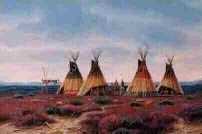
Does your system discourage large material possessions in one man?
Does your system provide for the sick, the helpless, the weak, the old and the stranger?
Does your system guarantee the integrity of the natural group called the family?
Does your system recognize and further the fundamental thought that the chief duty of man is the attainment of manhood, which means the perfect and harmonious development of every part and power that goes to make a man; and the consecration of that manhood to the service of one's people?
By every one of these tests, the White Civilization is a failure.
How is it that we of the Whiteman's way have just as much food in the land as ever we had, just as much wealth as ever we had, just as much need for labour, just as much material of every kind, just as much readiness to work; and yet we are facing a breakdown because we cannot co-ordinate these things into effective action?
Our system has broken down — our Civilization is a failure. Wherever pushed to a logical conclusion, it makes one millionaire and a million paupers. There is no complete happiness under its blight.
Men of the White Race! We speak now as representative of the most heroic race the world has ever seen, the most physically perfect race the world has ever seen, the most spiritual Civilization the world has ever seen.
We offer you the Message of the Redman, the Creed of Manhood. We advocate his culture as an improvement on our own, if perchance by belated repentance, remorse, restitution, and justification, we may save ourselves from Divine vengeance and total destruction, as did the Ninevites in their final stance; so that we may have a chance to begin again with a better higher thought.
Living their beliefs
How did the Native and Euro-American philosophies manifest themselves—at least before Westerners conquered most of the world's indigenous people? In lifeways with very different priorities, as the following quotes suggest:
They are much happier than people in Europe, even happier than the rich and comfortable. The native sleeps better on hard ground than a rich man does on his feather bed. "In all his life," the priest insists, "the California native never has, or learns, anything to worry or distress him or to destroy his joy in life and make death desirable. Furthermore, there is no one, neither inside California, nor outside, to plague or persecute him, or to throw a lawsuit around his neck; no hail or army to lay waste his land, no fire or lightning to burn his barn or his farm. There is no envy, no jealousy, no defamation or slander to injure him. He has no fear of losing his property, no ambition to increase it. There is no moneylender to collect debts, no official to demand tribute, duties, head, road, and a hundred other kinds of taxes. There is no wife to hang more on her body than income warrants, no husband who spends on gambling or wins the money which should feed and clothe his family. There is no worry about the education of his children, no daughter to marry off, no depraved son to bring disgrace and ruin upon his house. In one word, in California and among the native Californians there is no 'mine and thine.'...
"Hardly one among them has a gray hair."
Charles Bowden, The Sonoran Desert, quoting Father Johann Jakob Baegert, S.J., as he described the natives of Baja California, c. 1751.
When an Indian child has been brought up among us, taught our language and habituated to our Customs, yet if he goes to see his relations and makes one Indian Ramble with them, there is no persuading him ever to return. [But] when white persons of either sex have been taken prisoners young by the Indians, and lived a while among them, tho ransomed by their Friends, and treated with all imaginable tenderness to prevail with them to stay among the English, yet in a Short time they become disgusted with our manner of life, and the care and pains that are necessary to support it, and take the first good Opportunity of escaping again into the Woods, from whence there is no reclaiming them.
Benjamin Franklin, letter to Peter Collinson, May 9, 1753
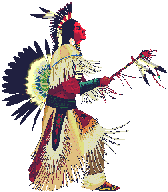
Conclusion
While I'd love to claim credit for my "brilliant" thesis, the idea that Western and Native cultures differ probably dawned centuries ago, when white men first reached America. Now it appears in newspapers and Time-Life books, among other places, which is about as conventional as it gets.
Rob
More on Native values
"Spiritual terrorism" against Indians
Native religions dead and gone?
Navajo preacher bashes Navajos
God to humans: Rape the Earth
Non-Native gods = waste of time
Potawatomi archbishop challenges Catholics
Court rules against Native religion
Westerman on Native spirituality
Freedom vs. balance
Why Natives aren't Christians
Reflections on Easter
Anishinabe culture helps vets
Mankiller: Indians think differently
Related links
A shining city on a hill: what Americans believe
America's exceptional values
America's cultural mindset
Native vs. non-Native Americans: a summary
|
. . . |

|
All material © copyright its original owners, except where noted.
Original text and pictures © copyright 2007 by Robert Schmidt.
Copyrighted material is posted under the Fair Use provision of the Copyright Act,
which allows copying for nonprofit educational uses including criticism and commentary.
Comments sent to the publisher become the property of Blue Corn Comics
and may be used in other postings without permission.